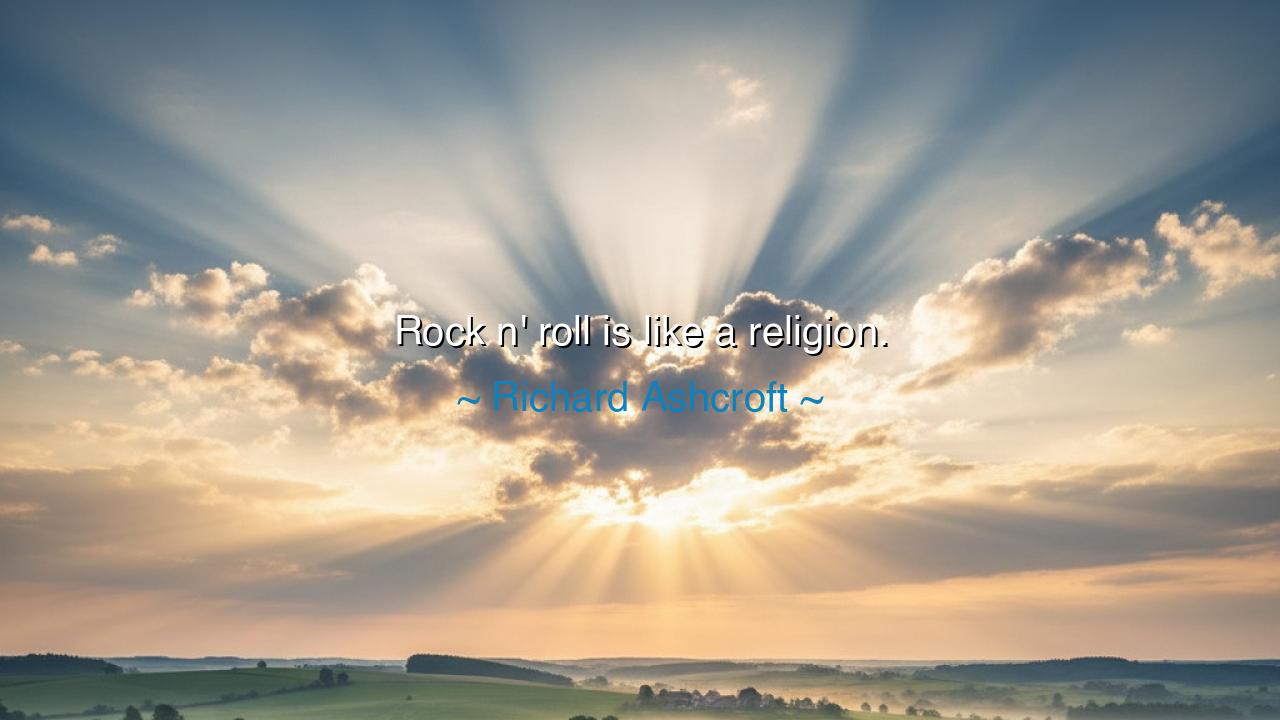
Rock n' roll is like a religion.






"Rock n' roll is like a religion." These words, spoken by Richard Ashcroft, carry with them a profound resonance, as they invite us to reflect on the powerful, almost sacred nature of music, particularly rock and roll. Religion, in its essence, is not merely a set of beliefs or rituals, but a force that shapes the soul, that guides the heart through the trials of life, and provides a sense of purpose and community. In this sense, Ashcroft’s statement captures the very spirit of rock and roll—a movement that transcended mere music to become a spiritual experience for millions.
To understand this deeper connection, we must look at the roots of rock and roll—a genre that emerged in the mid-20th century as a rebellion against the established norms. Just as religions throughout history have arisen as a challenge to the status quo, so too did rock and roll. It was not just a genre of music; it was a call to action, a cry of liberation, and an invitation to live freely. The musicians of the time, like Elvis Presley, Chuck Berry, and Little Richard, were not simply creating songs; they were creating anthems for a generation that was tired of the constraints of the old world, just as prophets of old challenged the established powers. The beat of rock and roll became the heartbeat of an entire cultural movement, much like the rhythms of ancient chants and religious ceremonies.
In the same way that religions offer rituals and symbols to unite followers, rock and roll brought people together through the experience of the concert and the record. When the crowd gathered to hear their favorite band play, it was not just an entertainment; it was a communal experience, a moment of transcendence. The energy exchanged between the band and the audience mirrored the spiritual communion between worshippers and deity. The lyrics, often reflecting themes of love, freedom, and defiance, became sacred texts, offering solace, courage, and a shared sense of identity.
Consider the Woodstock Festival of 1969, a monumental gathering of young people who, in their own way, were seeking a form of spiritual awakening through music. The three days of peace and music represented more than just a celebration of rock and roll; they were a declaration that music, like religion, could be a unifying force, one that broke down barriers and brought people together in a way that transcended politics, class, and race. The rituals of that festival—the music, the dancing, the collective celebration—were no different than the communal rituals practiced by ancient tribes who gathered to celebrate their gods and their shared stories.
The music itself, like the teachings of great religious figures, often carried a message of rebellion against the established powers. Bob Dylan, one of the most influential voices in rock, used his songs to speak against the injustices of his time, much like the prophets of old who used their words to challenge kings and emperors. In his anthems like "Blowin' in the Wind" and "The Times They Are A-Changin'," Dylan offered not only a voice of protest, but also a vision of a better world, much like the religious texts that guide people toward moral and ethical living.
However, the connection between rock and roll and religion is not solely about rebellion and freedom; it is also about the transformative power of music. Just as religion can bring healing, clarity, and peace to the soul, so too does rock music possess a healing power. The sheer emotional force of a song can transform a moment of despair into one of hope, and a simple chord progression can evoke feelings of joy, love, and unity. The best rock bands—from The Beatles to Queen—understood this power, using it to not just entertain, but to uplift and inspire.
The lesson that Ashcroft offers us is clear: rock and roll, like religion, is a powerful force for transformation and unity. It is a force that speaks to the human soul, that inspires action, and that brings people together in ways that few other mediums can. Yet, this power is not merely about entertainment; it is about connection. It is about recognizing that, like religion, music holds a mirror to the soul, helping us to understand ourselves, question our place in the world, and strive for something greater.
In our own lives, let us recognize the transformative power of music—whether it be rock, classical, or any genre—and embrace it as a form of spiritual expression. Just as religions have rituals and sacred texts, so too can music serve as a daily practice, one that connects us to our higher selves, to our communities, and to the greater truths of our existence. Let us celebrate the power of music as a form of unity, a force that speaks to the soul and binds us together, just as religion has done for millennia. Rock and roll is, indeed, a religion—one that carries within it the power to shape our hearts, minds, and futures.






AAdministratorAdministrator
Welcome, honored guests. Please leave a comment, we will respond soon